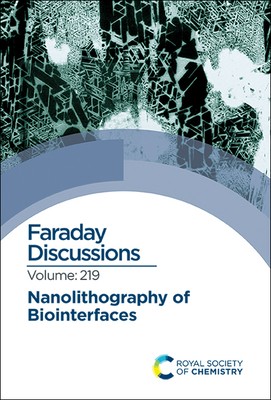
- We will send in 10–14 business days.
- Publisher: Royal Society of Chemistry
- ISBN-10: 1788016769
- ISBN-13: 9781788016766
- Format: 16 x 23.6 x 1.5 cm, hardcover
- Language: English
- SAVE -10% with code: EXTRA
Nanolithography of Biointerfaces (e-book) (used book) | bookbook.eu
Reviews
Description
In studying biological interfaces where carbohydrates are prevalent, scientists are only beginning to investigate how chemical composition, binding thermodynamics, and 3D structure work synergistically to control development, communication, and disease progression. Capturing the interfacial dynamics that drive the mechanical and biological properties of natural carbohydrate-based nanomaterials will require synergistic advances in 3D nanolithography, surface characterization, and organic and macromolecular chemistry at interfaces. This Faraday Discussion brings together researchers from various fields including printing tool development, surface chemistry, binding thermodynamics, and glycobiology to discuss how 3D nanolithography can increase our understanding of biointerfaces.
EXTRA 10 % discount with code: EXTRA
The promotion ends in 18d.11:28:18
The discount code is valid when purchasing from 10 €. Discounts do not stack.
- Publisher: Royal Society of Chemistry
- ISBN-10: 1788016769
- ISBN-13: 9781788016766
- Format: 16 x 23.6 x 1.5 cm, hardcover
- Language: English English
In studying biological interfaces where carbohydrates are prevalent, scientists are only beginning to investigate how chemical composition, binding thermodynamics, and 3D structure work synergistically to control development, communication, and disease progression. Capturing the interfacial dynamics that drive the mechanical and biological properties of natural carbohydrate-based nanomaterials will require synergistic advances in 3D nanolithography, surface characterization, and organic and macromolecular chemistry at interfaces. This Faraday Discussion brings together researchers from various fields including printing tool development, surface chemistry, binding thermodynamics, and glycobiology to discuss how 3D nanolithography can increase our understanding of biointerfaces.


Reviews